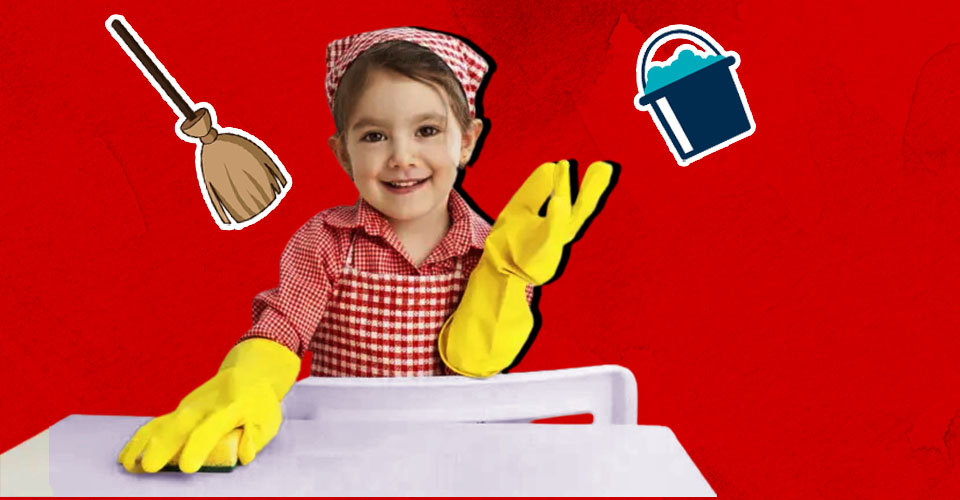Introducing children to household chores is a pivotal step in their development, offering a myriad of benefits beyond simply lightening the load for parents.
From instilling responsibility to fostering independence and teamwork, assigning chores to kids equips them with essential life skills that will serve them well into adulthood.
In this comprehensive guide, we delve into how to divide chores among children, offering ten effective tips for parents to streamline the process and cultivate a harmonious family dynamic.
Whether you’re embarking on this journey for the first time or seeking to refine your chore distribution strategy. Join us as we explore practical insights and actionable strategies to empower your children and nurture a sense of shared responsibility within your household.
Why You Should Assign Chores To Kids?
Before we get started with how to divide chores among kids, it is important to understand why is it necessary in the first place:
1. Responsibility:
Assigning chores to kids cultivates a sense of responsibility by entrusting them with tasks essential to the functioning of the household.
Through regular completion of these tasks, children learn the importance of accountability and contribute actively to the family’s well-being, fostering a sense of ownership and pride in their contributions.
2. Life Skills:
Engaging in chores equips children with valuable life skills crucial for their development. From organizing their time to problem-solving, children learn to manage tasks efficiently, prioritize responsibilities, and navigate everyday challenges independently.
These skills lay a solid foundation for success in various aspects of their lives, promoting resilience and adaptability.
3. Independence:
By participating in household chores, children gain a sense of independence and self-sufficiency. They learn practical skills necessary for daily living, such as cooking, cleaning, and laundry, empowering them to take care of themselves and their environment.
This independence fosters confidence and self-esteem, preparing children to navigate the complexities of adulthood with competence and resilience.
4. Teamwork:
Chores provide opportunities for children to engage in teamwork and collaboration with family members. By working together to complete tasks, children develop essential social skills, such as communication, cooperation, and problem-solving.
They learn to appreciate the value of collective effort and mutual support, strengthening family bonds and fostering a sense of unity and belonging when you assign chores.
5. Appreciation:
Participation in household chores encourages children to develop a greater appreciation for the efforts of others. As they take on responsibilities within the household, children gain insight into the time, effort, and resources required to maintain a home.
This deepened understanding fosters empathy and gratitude, as children learn to recognize and acknowledge the contributions of family members, cultivating a culture of respect and appreciation within the family dynamic.
Assigning chores to children not only teaches them practical life skills but also instills values such as responsibility, independence, teamwork, and appreciation. By actively participating in household tasks, children develop essential qualities that promote their overall growth and well-being.
By learning how to divide chores you are preparing them for the challenges and opportunities that lie ahead.
Read More: 10 Effective Ways to Develop Emotional Intelligence in Children
When Should You Start To Delegate Chores To Kids?
The important factor when learning how to divide chores among kids is to do it at the right time.
You start assigning children tasks as soon as they hit preschool at the age of 3 to 5. Begin with things they can do without much trouble — putting away toys or dressing themselves, with some helping hands.
As your kids grow and get bigger, introduce more complicated responsibilities into their lives. Each task should be tailored to their age and unique abilities.
To determine which tasks are appropriate, consider which would be possible for your child to achieve at each age:
- 2-3 year-olds: Assist in cleaning up toys, groceries, and dressing themselves with a little guidance.
- 4-5-year-olds: Feed pets, make beds (even if not perfectly), put dishes away after meals.
- 6-7-year-olds: Clean tables and counters, put laundry away, sweep floors.
- 7-9-year-olds: Load/unload the dishwasher, help prepare meals, pack their school lunches.
- 10-11 year olds: Change sheets on bed, clean kitchen/bathrooms, yard work.
- 12 years old or older: Wash car(s), assist with younger siblings when needed (if there are any), grocery shop/run errands alone.
Of course, it is expected that your child may struggle to complete certain chores at some point. If you notice this happening over and over again however it could represent an underlying conflict or concern that should be looked into further.
Try your best to communicate openly with them about these tasks – ask them what’s up or what’s wrong if they avoid it completely one day – so that you two can come to an understanding of how important it is for everyone involved.
Read More: Talking To Kids About Gender Identity: 10 Effective Tips For Parents!
How To Divide Chores Among Kids: 10 Tips For Parents
Dividing chores among kids can be a smooth process.
The following are some tips on how to divide chores among kids:
1. Consider Age and Abilities:
It’s crucial to assign chores that are appropriate for your children’s age and abilities. For 2-5-year-olds, simpler tasks like picking up toys or putting away groceries with assistance will suffice.
As they grow older, around 6 years old and up, they can handle more challenging responsibilities like vacuuming, sweeping, or folding laundry.
When you delegate chores to the kids it gives their confidence a boost and minimizes frustration. A positive experience like this sets a foundation for future responsibilities in a household.
2. Create a Chore Chart:
A visual chore chart is a practical, proven way to organize household tasks and encourage responsibility. On this chart, each child gets a section with specific things for them to do every week.
When you delegate chores to the kids it keeps things interesting and makes sure no one’s stuck doing the same thing over and over. Plus, if you involve your little ones in the chart-making process, they’ll be more likely to care about it later on — and do their chores without being asked.
3. Be Clear and Specific:
The key to getting your kids to do their chores and understand them is clear instructions. And if they don’t get it, even the smallest chore can go south. Make sure you tell them exactly what to do, how they should do it, and any other expectations that come with the task.
For instance, if you ask them to clean their room, make sure you tell them what they need to put away, where everything goes specifically, and how you expect their room to look once they’re done.
Minimizing confusion and laying out how they should complete tasks empowers your children by giving them initiative and responsibility for whatever they’re doing.
4. Delegate Chores To The Kids Equally:
Maintaining a sense of fairness and equity in chore distribution among siblings is important for promoting harmony and cooperation within the household.
When learning how to divide chores, consider each child’s capabilities, interests, and existing commitments to ensure that responsibilities are distributed evenly.
Delegate chores to the kids regularly to prevent any one child from feeling burdened or resentful and to provide opportunities for all children to develop a range of skills and competencies.
Balancing tasks equitably fosters a sense of teamwork and shared responsibility among siblings, contributing to a positive family dynamic.
5. Offer Choices:
Providing opportunities for your children to choose their chores can significantly increase their motivation, engagement, and autonomy. The trick is to give them options within what needs to be done.
Giving your child a choice will make the task feel like theirs, making them more likely to be proactive about it in the future. And that’s not all; It’ll also encourage them to contribute with tasks that they’re good at and interested in.
For example, if your kid loves being outside, they’ll likely prefer mowing the lawn or weeding the garden over doing dishes. And if your kid enjoys cooking (or eating), then setting the table will probably sound better than taking out the trash.
By letting kids have some authority over which chores they do, parents can foster a sense of collaboration and cooperation. Suddenly chores won’t feel like obligations and become something that allows for personal growth and contribution instead.
6. Set Realistic Expectations:
When you delegate chores to the kids, it’s important to set realistic expectations that take into account their age, abilities, and developmental stage. It is an important part of understanding how to divide chores among kids.
Avoid overwhelming children with tasks that are too complex or demanding for their current level of skill and maturity, as this can lead to frustration and resistance.
Instead, choose chores that are appropriate and manageable for each child’s age and capabilities, gradually increasing the complexity and difficulty of tasks as they grow and develop.
7. Encourage Teamwork:
Promoting a sense of teamwork and cooperation among siblings is essential in creating a supportive family environment.
One way to do this is by giving children collective chores that require them to work together towards a common goal. This not only lightens the load for each child but also instills camaraderie and shared responsibility.
Parents should encourage children to communicate, collaborate, and support each other while they complete tasks together. Remind kids that working as a team makes the job easier, faster, and more fun.
Through promoting teamwork and cooperation, parents can build strong sibling bonds and cultivate a positive family culture based on mutual respect, support, and collaboration.
Parents need to recognize when their child has done their part in household chores. Rewarding these accomplishments can motivate further contributions. Not only does positive reinforcement boost self-esteem and confidence, but it also fosters an association between helping out around the house with good feelings.
Read More: 10 Effective Ways How Parents Can Foster Attachment in Childhood Development!
A Word From Mind Family
Delegating chores to the kids is not just about building practical life skills, it’s also about these other things. By learning how to divide chores you are building a sense of responsibility in your kid.
By having your kids do chores they will learn how to do a task on their own, understand when and why it’s important to be accountable for one’s actions, and most importantly perform tasks with others. All of these are essential qualities that promote a child’s overall growth and well-being, preparing them for the challenges and opportunities that lie ahead.
Always remember none of this is possible without your help. By pushing them to do their fair share from an early age they’ll grow more responsible as time goes on, ultimately fostering a sense of pride in their hard work that later translates into mutual respect towards others.
Here are some tips you can use to navigate chore distribution better so you can hopefully see those results sooner rather than later.
Frequently Asked Questions (FAQs)
1. When should you start to delegate chores to kids?
Start assigning chores as soon as they hit preschool age, typically around 3 to 5 years old. Begin with simple tasks like putting away toys or dressing themselves, gradually introducing more complex responsibilities as they grow and develop.
2. How to divide chores among kids?
Divide chores based on age and ability, creating a chore chart to outline specific tasks for each child. Be clear and specific with instructions when you assign chores, balance tasks evenly among siblings, offer choices to increase motivation, and set realistic expectations. Encourage teamwork and provide positive reinforcement for their efforts.
3. Why you should assign chores to kids?
Assigning chores cultivates responsibility, teaches life skills, fosters independence and teamwork, and promotes appreciation for others’ efforts. It instills values such as accountability, pride, and mutual respect, preparing children for future challenges and opportunities while contributing to a positive family dynamic.












Leave a Reply